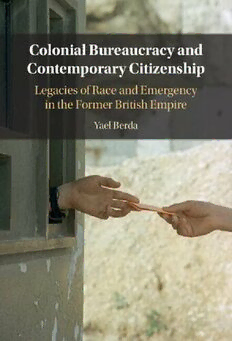
Colonial Bureaucracy and Contemporary Citizenship: Legacies of Race and Emergency in the Former British Empire PDF
Preview Colonial Bureaucracy and Contemporary Citizenship: Legacies of Race and Emergency in the Former British Empire
ColonialBureaucracyandContemporaryCitizenship Colonial Bureaucracy and Contemporary Citizenship examines how the legacies of colonial bureaucracy continue to shape political life afterempire.FocusingontheformerBritishcoloniesofIndia,Cyprus, andIsrael/Palestine,thebookexploreshowpostcolonialstatesusetheir inherited administrative legacies to classify and distinguish between loyal and suspicious subjects and manage the movement of populations, thus shaping the practical meaning of citizenship and belonging within their new boundaries. The book offers a novel institutionaltheoryof“hybridbureaucracy”toexplainhowracialized bureaucratic practices were used by powerful administrators in state organizationstoshapethemakingofpoliticalidentityandbelongingin thenewstates.Combiningsociologyandanthropologyoflawandthe statewiththestudyoforganizations,thisbookoffersnewknowledgeto overturn conventional understandings of bureaucracy, demonstrating how routine bureaucratic practices and persistent colonial logics continuetoshapeunequalpoliticalstatustothisday. Yael Berda is Assistant Professor of Sociology and Anthropology at Hebrew University and a non-resident fellow with the Middle East Initiative at the Harvard Kennedy School of Government. She is the authorofLivingEmergency:Israel’sPermitRegimeintheWestBank (2017)andTheBureaucracyoftheOccupation(2012).Berdahasworked as a practicing lawyer specializing in administrative, constitutional, and internationallawinIsrael/Palestine. Published online by Cambridge University Press Published online by Cambridge University Press Colonial Bureaucracy and Contemporary Citizenship Legacies of Race and Emergency in the Former British Empire YAEL BERDA HebrewUniversity Published online by Cambridge University Press UniversityPrintingHouse,Cambridgecb28bs,UnitedKingdom OneLibertyPlaza,20thFloor,NewYork,ny10006,USA 477WilliamstownRoad,PortMelbourne,vic3207,Australia 314–321,3rdFloor,Plot3,SplendorForum,JasolaDistrictCentre, NewDelhi–110025,India 103PenangRoad,#05–06/07,VisioncrestCommercial,Singapore238467 CambridgeUniversityPressispartoftheUniversityofCambridge. ItfurtherstheUniversity’smissionbydisseminatingknowledgeinthepursuitof education,learning,andresearchatthehighestinternationallevelsofexcellence. www.cambridge.org Informationonthistitle:www.cambridge.org/9781316511664 doi:10.1017/9781009053495 ©YaelBerda2023 Thispublicationisincopyright.Subjecttostatutoryexception andtotheprovisionsofrelevantcollectivelicensingagreements, noreproductionofanypartmaytakeplacewithoutthewritten permissionofCambridgeUniversityPress. Firstpublished2023 AcataloguerecordforthispublicationisavailablefromtheBritishLibrary. LibraryofCongressCataloging-in-PublicationData names:Berda,Yael,author. title:Colonialbureaucracyandcontemporarycitizenship:legaciesofraceand emergencyintheformerBritishEmpire/YaelBerda. description:Cambridge;NewYork,NY:CambridgeUniversityPress,[2022]| Includesbibliographicalreferencesandindex. identifiers:lccn2022026119|isbn9781316511664(hardback)|isbn 9781009054393(paperback)|isbn9781009053495(ebook) subjects:lcsh:Bureaucracy–Asia.|Civilservice–Asia.|Postcolonialism–Asia.| Asia–Politicsandgovernment–1945-|Asia–Racerelations.|Asia–Colonial influence.|GreatBritain–Colonies–Asia.|GreatBritain–Colonies–Administration. |bisac:socialscience/Sociology/General classification:lccjq32.b472022|ddc351.5–dc23/eng/20220801 lcrecordavailableathttps://lccn.loc.gov/2022026119 isbn978-1-316-51166-4Hardback CambridgeUniversityPresshasnoresponsibilityforthepersistenceoraccuracyof URLsforexternalorthird-partyinternetwebsitesreferredtointhispublication anddoesnotguaranteethatanycontentonsuchwebsitesis,orwillremain, accurateorappropriate. Published online by Cambridge University Press Contents ListofFigures pagevii Preface ix Acknowledgments xiv ListofArchiveAbbreviations xx Introduction:TheSpectacleofIndependenceandtheSpecter ofBureaucracy 1 part i hybrid bureaucracy: how race and emergency shaped the organization of colonial rule 29 1 TheEffectiveDisorderofHybridBureaucracy 31 part ii the axis of suspicion: classifications of identity and mobility in crises 57 2 FormsofSuspicion:MobilityAsThreat,CensusAs Battleground 63 3 TheBureaucraticToolkitofEmergency 90 part iii administrative memory and the legacies of emergency 127 4 LoyaltyandSuspicion:TheMakingoftheCivilServiceafter Independence 131 5 HowHybridBureaucracyandPermitRegimesMade Citizenship 161 v Published online by Cambridge University Press vi Contents Conclusion:TheFileandtheCheckpoint–ColonialBureaucracy andtheMakingofContemporaryCitizenship 202 Notes 216 Bibliography 242 Index 270 Published online by Cambridge University Press Figures 1 ProposedBritishpartitionplanduringtheCyprusEmergency 1956 page73 2 Landownershipmapby“race”Cypruscensus1960 75 3 Thelegaltoolkitformanagingpopulations,India1914–1945 114 4 PercentageofGreekandTurkishCypriotsinthecivilservice, December1963 138 5 Civilservicestaff,MandategovernmentofPalestinefor1937 153 6 Post-partitionIndia 171 7 Mapofmilitarygovernmentandclosureofnortherndistricts 181 8 Mapofmilitarygovernmentterritories:north,central,andsouth 182 9 MapofTurkishCypriotenclaves 197 vii Published online by Cambridge University Press Published online by Cambridge University Press Preface The origin of this study began with a practical problem. When repre- senting Palestinians who were detained without trial after protesting againsttheSeparationWallin2004,asanovicehumanrightslawyerin military courts, I could make arguments about the (il)legality of a military decree or invoke habeas corpus. I could make arguments about human rights violations. They mostly failed, but the arguments could be made, and even written into a protocol and addressed in the telegraphic,stencileddecisionsofthemilitarycourts.However,mostof the cases I represented were much more mundane. Those cases could not be argued about in court. They almost seemed to be “outside” or “beyond” the rule of law. Not because they were exceptional but becausetheyweresoroutineandmundane.Theyweren’tabout“regu- lations,” or “rights.” They evaded the realm of “administrative law.” Theywereaboutbureaucracy.Theywerecasesofworkerswhoneeded documents to cross checkpoints and access their work in Israeli cities and were denied entry by Israel’s civil military administration for vari- ous“security”reasons.Onesimplycouldn’targueabouttheir“rights” in courts. There were no formal laws that governed the permit system. The administrative regulations were unpublished and the military decreeshardtodecipher.TheIsraelilegalsystem perceivedthe permits tomovenotasrightsbutasasystemofprivilegesthatcouldbegranted or revoked with no obligations. I gradually discovered that, (alongside theworkersthemselves,employers,PalestinianandIsraelilawyers,and human rights organizations,) there was a massive system to regulate PalestinianmobilitythathaddevelopedalongsidetheOslopeacenego- tiations and was a feature of separation due to the promissory note of ix https://doi.org/10.1017/9781009053495.001 Published online by Cambridge University Press
